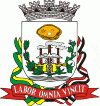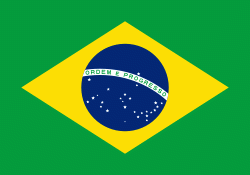Birigüi (Birigui)
 |
As the major cities of the region, Birigui, emerged and grew from the Northwest Railway, built at the beginning of the century. In the beginning was a key in the clearing, located between the kilometers 259 and 261 that in 1908 happened to be a point of stop of locomotives. The town was founded on December 7, 1911 by Mr. Nicolau da Silva Nunes, an entrepreneurial Portuguese native of the Parish of Moutamorta, Trás-os-Montes.
The founder maintained in the future city the denomination given by the workers of the local railroad. The name Birigui originated in the Tupi-Guarani language, the Indians used this word as the meaning of "fly that always comes" to a tiny hematophagous mosquito that bothered everyone and was quite frequent in the region. Nicolau da Silva Nunes met the region attracted by a newspaper article, on the first visit he was charmed by the exuberance and fertility of the lands of the region, especially those that involved the key of Birigui. He bought 400 bushels for himself and his representatives, Antonio Gonçalves Torres and Afonso Garcia Franco, and when he returned to Sales de Oliveira, the city where he lived, he placed the lots on sale.
Nicolau da Silva Nunes envisioned that those forests, the fertile land and the clear waters emanated progress. The only difficulty in his enterprise was his neighbors, the Crowned Indians. To avoid frightening his customers, he used trickery, he asked, until they had erased the Indians' trail and moved in two wagons to demonstrate security. However, neither the hostility of the Indians nor the presence of the small mosquito discouraged the first inhabitants. The first residents who accompanied the founder were Francisco Galindo Romero, Manoel Inacio, Francisco Galindo de Castro and his wife, Dona Antonia Real Dias, the first woman to live here. The first house was erected made of mud, at the confluence of the present Silvares and Founders' Streets. Lucas Scarpin, Antonio Simões, Faustino Segura, Ricardo Del Nery, João Galo, France Contel and Giuzeppe Fonzar were some of the pioneers. In 1912, Birigui gains another inhabitant, José Cordeiro, a typical bandeirante captain who leaves Lençóis Paulista with his expedition and joins the town. Manuel Bento da Cruz founded the company of Lands, Timber and Colonization São Paulo, with as pioneers Roberto Clark and James Mellor.
With the passage of time, the crop is occupying what was bush. Our coffee cycle is coming. With this rampant progress, Birigui achieved his emancipation on December 8, 1921, only ten years after its foundation. In February 1922 the first town hall of Birigui was elected, a month later Archibald Thomas Clark took office as the first mayor.
Map - Birigüi (Birigui)
Map
Country - Brazil
Currency / Language
| ISO | Currency | Symbol | Significant figures |
|---|---|---|---|
| BRL | Brazilian real | R$ | 2 |
| ISO | Language |
|---|---|
| EN | English language |
| FR | French language |
| PT | Portuguese language |
| ES | Spanish language |


















